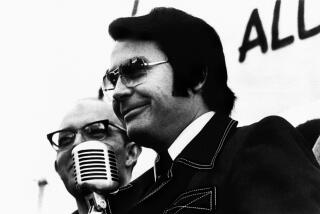Faith Healing Subjected to Scrutiny : Editor Seeks to Lay Hands on the Truth: Does It Work?
- Share via
Television evangelist Ernest Angley moved to the front of his audience during a healing service at his Grace Cathedral in Akron, Ohio.
He touched one woman on the forehead, loudly asking that Jesus heal her. She fell back into the arms of three attendants, who laid her on the floor and partly covered her with a blue cloth.
Angley did the same to three more people, each of whom swooned in a phenomenon sometimes called “slain in the spirit” by believers in Pentecostal and charismatic churches. Many believe that some healing accompanies the apparent fainting.
But on that January evening, Angley also approached Paul Kurtz, editor of the humanist-oriented Free Inquiry magazine, who was there unannounced, along with three associates.
Wired for Sound
Kurtz, who had a tape recorder hidden under his hat, was touched on the forehead by Angley, who cried out, “In the name of Jesus, he-ea-ul.”
“I was not going to take part in this charade, so I stood my ground and did not fall back,” Kurtz wrote in Free Inquiry’s spring issue, which is devoted to skeptical assessments of faith healers.
Angley “hit” him on the forehead, but again Kurtz did not yield. Kurtz said Angley asked him, “Do you wish to be saved? Are you born again? In Jesus’ name I command these to happen.”
Kurtz continued: “He put his arm around me and forcibly tried to push me down, but I steadfastly refused to fall. We were eyeball to eyeball. . . . Angley tarried a bit, and then left me.”
A spokesman for Ernest Angley Ministries in Akron said this week that the minister just returned from a foreign trip and may not have seen the magazine. Angley did not respond to a request for comment.
Participants Interviewed
The magazine contained interviews with people who said their ailments were not healed, despite claims by certain evangelist-healers. Among other analyses was one of “700 Club” host M. G. (Pat) Robertson, who is exploring possibilities of a run for the 1988 Republican presidential nomination.
Kurtz criticized the occasional “words of knowledge” spoken by Robertson on television about a malady suffered by an unnamed viewer, along with a prediction that prayer will bring about a cure. “With millions of listeners,” Kurtz said, “the probabilities are that a certain percentage of them will have the conditions named and also that percentage will be cured by normal means.”
At a news conference Friday in Los Angeles, Kurtz, of Buffalo, N.Y., talked about the purposes of the Committee for the Scientific Examination of Religion with its chairman, Gerald Larue, USC professor emeritus of archeology and biblical studies.
Examining Claims
The critiques of faith-healing practices were part of the committee’s effort to examine the claims of both traditional and sectarian religions “in the light of scientific inquiry.”
Kurtz charged that faith healers appeal to religious beliefs to fend off criticism and have been able to discourage governmental regulation because of First Amendment provisions for church-state separation.
“We believe the public has a right to the evidence, and particularly to the conclusions that will be reached about the efficacy of faith healing,” said Kurtz, who also urged the medical profession to engage in further inquiry.
Nevertheless, in the same issue of Free Inquiry, one writer suggested that not all participants in healing rallies are as gullible as they might seem. While suggesting that faith healers generally are cruel in raising expectations that often go unmet, philosophy Prof. Joseph E. Barnhart of North Texas State University said participants seem to accept the “drama” aspect of the healing service and see a longer-range goal of producing faith, not simply healing.
If an evangelist seems at times to be making only a pretense at healing, “they will not regard the element of pretense as fundamentally evil or deceitful” because they are part of the unfolding supernatural drama. “To condemn him is to condemn themselves. To defend him is to defend themselves,” Barnhart said.
More to Read
Sign up for Essential California
The most important California stories and recommendations in your inbox every morning.
You may occasionally receive promotional content from the Los Angeles Times.









